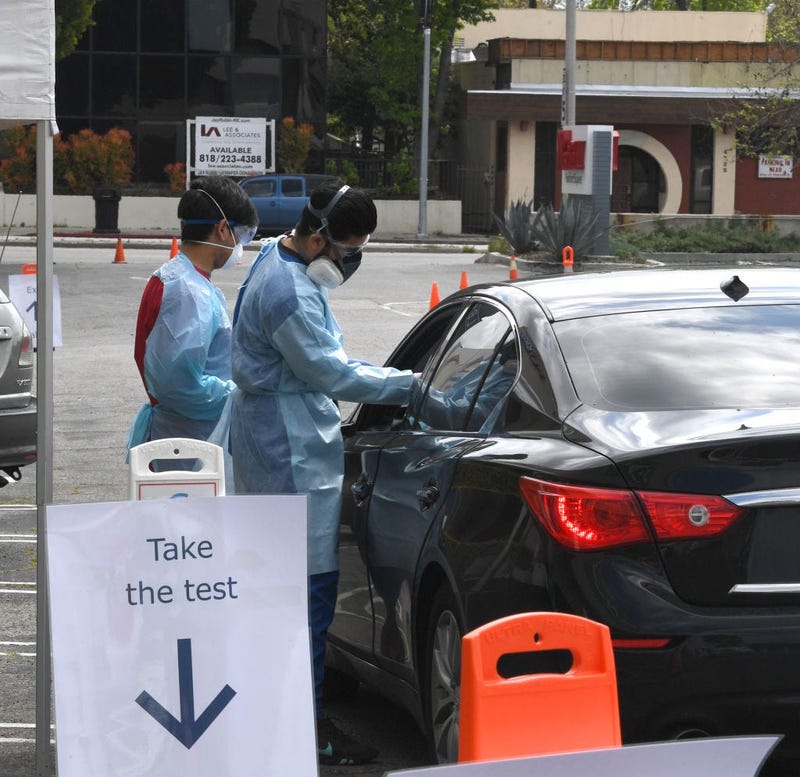
KYW Newsradio’s Medical Reports are sponsored by Independence Blue Cross.
KYW Newsradio medical editor Dr. Brian McDonough answers all of your coronavirus-related questions below.
___
Q: We bought a few ear loop surgical masks and wanted to know how long they last and when should we change them.
A: The problem with masks that are not able to be washed is the fact that once they are worn in public, you can't touch the front of the mask without risking infection.
Remember, the mask is designed to block fluids from other people coughing, sneezing or even talking within close proximity from infecting you. It also prevents you from doing the same to others.
When you are done with the mask, you have to consider that the virus may be on the surface of the mask.
At the hospital we make certain to remove the mask by the elastic ear loops to not touch the front. Any time you remove any mask, you should wash your hands immediately and avoid touching the mask while wearing it.
Q: Are there two types of coronaviruses?
A: At this point, the Centers for Disease Control and other leading health organizations believe that COVID-19 has only one strain, and they also say that it does not appear to be mutating.
This is very important because efforts to develop vaccines are dependent on a stable virus that does not change.
Of course this does not mean that it cant or will not mutate. Viruses, particularly so called smart viruses like the coronavirus, actually can mutate and change, causing even greater problems.
We do know that COVID-19 attacks different patients in different ways.
Q: Is there any research lately on blood irradiation using uvc?
A: Back in the 1930s and 1940s, before the age of antibiotics, scientists would try almost anything to fight infection.
Remember, back then both bacterial infections (now treated with antibiotics) and viral infections (now treated with antivirals) were devastating.
COVID-19 is a throwback to those years before effective treatments and immunizations. One of the treatments that had some degree of success was using ultraviolet radiation to rid the blood of infectious agents.
I looked back at the old literature and there were stories of limited success, but with the onset of antibiotics, the treatment was lost to time. There are numerous treatments being studied today, but at the present time, blood irradiation is not an area of focus.
Q: Once you get COVID-19, does that confer lifetime immunity?
A: Most of us believe and hope that immunity to COVID-19 will be long lasting. When a virus like COVID-19 attacks our bodies, it causes an immune reaction that makes our body produce antibodies against the virus.
These antibodies fight off the virus and kill it.
In cases of those who get very sick, the antibody reaction isn't effective enough or it actually stimulates a recation in the body called a cytokine storm, which can damage vital organs like the lungs.
For those who get through the infection, the body's antibodies have a memory of sorts that recognizes the virus if it attacks again and kills it.
This concept is how vaccines work: They give the body a harmless dose of the virus, allowing the person to build an antibody response.
The only problem is if COVID-19 mutates, which could make our immune reaction less effective.
Q: Can you get a false positive rating if you have some other kind of virus or cold?
A: The question of false positives often comes up when we talk about testing for COVID-19, this question is one that scientists are looking at very closely.
At this point, researchers have tested various methods to make certain that a positive test is linked to COVID-19 and not another form of coronavirus.
Naturally, a false positive test has implications, including quarantine and fear for both the patient and family.
False negative is even more disturbing because if someone tests negative and actually is carrying the virus, they could infect many people unwittingly.
Errors do occur, but thus far, the testing has been quite accurate. The problem we face at the present time is we need more tests and a greater sense of how COVID-19 is impacting the community.
